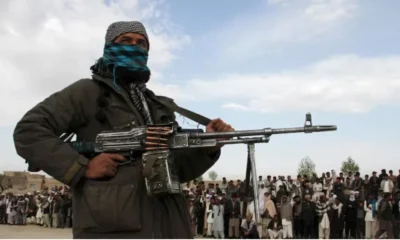Pakistan has complied with just one the 40 recommendations set by the Financial Action Task Force (FATF), the Asia-Pacific Group (APG) of global terror financing watchdog said today, Monday, Oct 7.
It also said Pakistan has failed to fully implement a UN Security Council resolution against Hafiz Saeed and other UN-designated terrorists, as well as outfits like Jaish-e-Mohammed and the Lashkar-e-Taiba, according to media reports.
The APG’s much awaited ‘Mutual Evaluation Report’ running into 228 pages was released on Saturday, ten days ahead of the key FATF plenary meeting which will give its decision on Pakistan’s ‘grey list’ status.
It said: “After the APG report, chances are high that Pakistan would be retained on the grey list during the FATF plenary meetings from October 13 to 18 in Paris.”
Pakistan was placed on the grey list in June last year and given a plan of action to complete by October 2019 or face the risk of being placed on the black list with Iran and North Korea.
According to the report, out of FATF’s 40 recommendations on curbing money laundering and combating the financing of terrorism, Pakistan was fully compliant only on one. It was largely compliant on nine, partially compliant on 26 and non-compliant on four recommendations, The Express Tribune reported.
“Pakistan has not taken sufficient measures to fully implement UNSCR 1267 obligations against all listed individuals and entities – especially those associated with Lashkar-eTayyiba (LeT) / Jamaat-ud-Dawa (JuD), and Falah-i-Insaniat Foundation (FIF) as well as the groups,” the FATF report read, according to a report by news agency ANI.
“Pakistan should adequately identify, assess and understand its ML (Money Laundering) / TF (Terror Financing) risks including transnational risks and risks associated with terrorist groups operating in Pakistan such as Da’esh, AQ, JuD, FiF, LeT, JeM, HQN, and this should be used to implement a comprehensive and coordinated risk-based approach to combating ML and TF,” the report added.
The APG report, however, applauded Pakistan’s efforts to combat corruption.
The APG report also states that Pakistan faces high risks of money laundering and terror financing and it needs to improve the understanding of these risks that are also animating from various terrorist groups operating in the country.
The report disagreed with Pakistan’s self-assessment that it only faces “medium” category risks, saying that national regulators like the State Bank of Pakistan and the Securities and Exchange Commission of Pakistan – had very limited understating of money laundering and terror financing regimes.
In its National Risk Assessment report, Pakistan did not believe that money laundering and terrorism financing were high-risk category areas.
Contrary to the assessment by Pakistan that its overall terror financing risk assessment is “medium”, Pakistan faces significant risk of terror financing both from legitimate and illegitimate sources as well as weak or no, regulation and supervision of certain sectors such as hawala/hundi, NPOs (Non-Profit Organisation) and DNFBPs (Designated Non-Financial Businesses and Professions) and porous borders, according to the report.
“The terror financing cases are identified by a number of mechanisms but not via financial intelligence,” the report said.
“Competent authorities have varying levels of understanding of the country’s money laundering and terror financing risks, and the private sector has a mixed understanding of risks,” the report said.
There are no measures in place to address the money laundering and terror financing risks posed by trusts, including foreign trusts, and waqfs in Pakistan, the report said.
The report advised that Pakistan should significantly enhance the use of financial intelligence in money laundering, terror financing, and predicate crime cases, particularly the use of financial intelligence to target terrorist groups and higher- risk predicate crimes.
The terrorist groups operating in Pakistan are reported to include but not limited to ISIS-Khorasan, Tehreek-e-Taliban Pakistan, Quetta Shura Taliban, Haqqani Network and Lashkar-e-Taiba (including its affiliates Jamaat ud Dawa and Falah-i-Insaniat Foundation), which raise funds through a variety of means, including direct support, public fundraising, abuse of NPOs and though criminal activities, the report added.
Blacklisting by FATF entails being downgraded by the International Monetary Fund, the World Bank and the Asian Development Bank and facing negative assessments from credit rating agencies such as Moody’s, Standard & Poor’s and Fitch.
India and other member countries of the FATF have charged Pakistan with failing to take concrete action against Hafiz Saeed, Masood Azhar and other UN-designated terrorists, pointing out that its anti-terror law still remains out of sync with standards set by the international body.
Pakistan contends it has done enough by seizing over 700 properties belonging to the Lashkar-e-Taiba, Jamaat-ud-Daawa, Falah-i-Insaniyat Foundation and the Jaish-e-Mohammed but India and other FATF members have pointed out that seizures do not necessarily indicate compliance.


 Latest world news13 hours ago
Latest world news13 hours ago
 Latest world news13 hours ago
Latest world news13 hours ago
 Latest world news12 hours ago
Latest world news12 hours ago
 India News12 hours ago
India News12 hours ago
 India News4 hours ago
India News4 hours ago
 Latest world news3 hours ago
Latest world news3 hours ago














